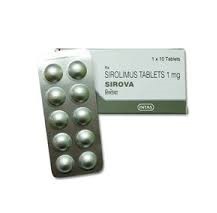Rapamycin
Packages:
| Quantity | Per Pill | Price | Order |
|---|---|---|---|
|
20/1mg pills
Free EMS shipping with every order |
$ 4.45 | $89.00 | |
|
100/1mg pills
Free EMS shipping with every order |
$ 2.90 | $290.00 | |
|
300/1mg pills
Free EMS shipping with every order |
$ 1.93 | $580.00 |
Description:
Rapamycin (sirolimus) is indicated for the prevention of organ rejection in renal transplant recipients aged 13 years or older. It is recommended Rapamycin to be used initially in a combination with cyclosporine and corticosteroids. In patients at low to moderate risk of acute rejection, cyclosporine should be withdrawn approximately 3 months after transplantation and Rapamycin dose should be increased to achieve recommended blood concentrations.
The safety and efficacy of cyclosporine withdrawal have not been studied in patients defined as high-risk for acute rejection (those who have had a biopsy proven case of severe acute rejection prior to cyclosporine withdrawal, those who are dialysis-dependent or with serum creatinine >4.5 mg/dL, black patients, patients receiving a repeat renal transplant, patients receiving multiple organs, and patients with evidence of exposure to foreign tissue). Withdrawal of cyclosporine in these patients is not recommended.
Important Safety Information
As with all immunosuppression, there is an increased risk of developing infection or malignancies. Only doctors experienced in immunosuppressive therapy and management of kidney transplant patients should prescribe Rapamycin . Patients receiving Rapamycin should be managed in appropriate medical facilities. The doctor who is responsible for immunosuppressive therapy should have complete information necessary for patient care.
While taking Rapamycin and cyclosporine, you will need to have periodic blood tests to check your blood cholesterol and triglycerides. Your doctor may recommend treatment if your blood cholesterol or triglycerides become too high. In patients taking Rapamycin with cyclosporine, increased blood creatinine levels have been observed, indicating a decrease in kidney function. Because of this, your doctor will be checking your blood creatinine level and may adjust your medications. You should also be aware that many prescription and nonprescription drugs can affect your kidney. Always check with your doctor before taking any new medications. Women of childbearing potential should use effective birth control prior to initiation of Rapamycin therapy, during Rapamycin therapy, and for 12 weeks after Rapamycin therapy has been stopped.
Liver Transplantation: The use of Rapamycin in combination with tacrolimus was associated with an increased risk of death and loss of the transplanted liver in a clinical study of newly transplanted liver patients. Many of these patients had evidence of infection at or near the time of death.
In this and another similar study, the use of Rapamycin in combination with cyclosporine or tacrolimus was associated with an increase in clotting of the main artery to the new liver. Most of these cases occurred within 30 days posttransplantation and most led to loss of the transplanted liver or death. The safety and effectiveness of Rapamycin in liver transplant patients has not been established, and therefore, such use is not recommended.
Lung Transplantation: The use of Rapamycin has been associated with breakdown of the airway connections in newly transplanted lung patients, in most cases leading to death. The safety and efficacy of Rapamycin in lung transplant patients have not been established, and therefore, such use is not recommended.
Specific side effects associated with Rapamycin include high cholesterol, high triglycerides, decreased blood platelets, anemia, impaired wound healing, high blood pressure, abnormal liver function tests, rash, acne, joint pain, diarrhea, swelling, and low potassium. If you experience any side effects, contact your doctor or transplant surgeon.
